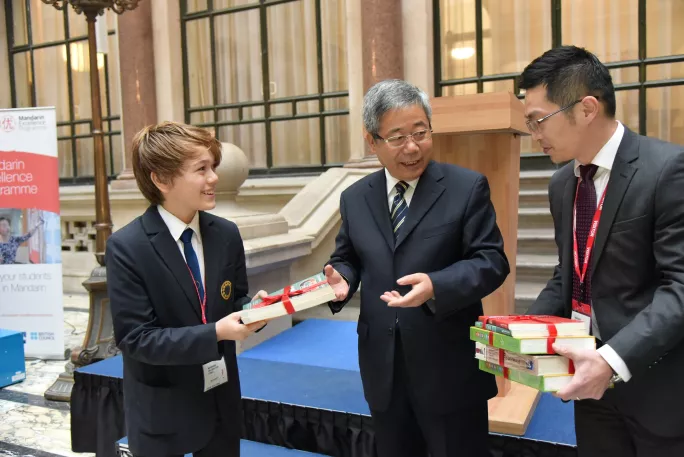- Home
- Will the government’s Mandarin scheme be more than a Chinese whisper?
Will the government’s Mandarin scheme be more than a Chinese whisper?

Chinese whispers is often played by pupils at break time - but this time the game is being taken literally.
More than a hundred Year 8 pupils are lining up and whispering a message in Mandarin to each other.
Silence descends on the Victorian courtyard in the Foreign Office as the 12- and 13-year-olds from 14 different schools across the country compete for a much sought-after prize of chocolates.
The pupils are here for the celebration event of the four-year Mandarin Excellence Programme - a government scheme to increase the uptake of Mandarin in schools - which is now in its second year.
In October, the government revealed that the majority of the 382 pupils on the programme last year achieved marks of 80 per cent or higher across tests in reading, writing, listening and speaking.
The aim of the £10 million scheme is to have at least 5,000 young people speaking Mandarin by 2020 - and at least 100 new qualified Chinese teachers by the end of the programme.
At the event yesterday, education secretary Justine Greening made a last-minute appearance at what was due to be her fellow minister Nick Gibb’s celebration.
She greeted the Chinese government’s minister of education, made a speech to the 14 schools and helped to hand out gifts to pupils: Mandarin textbooks wrapped up with festive red bows.
The ‘commitment’ of teachers and pupils
“You were the trailblazers and we wanted to say thank you,” Ms Greening said. “The level of fluency in Mandarin that you’ve achieved in your first year demonstrates the commitment of you and your teachers to this programme.”
The pupils’ personal achievements are not to be downplayed. It is hard not to be impressed when a group of Year 8s perform a short play on globalisation in Mandarin.
They told the story of Western fast-food chains opening up in China, leaving the Chinese restaurants concerned for their business.

However, the first wave of schools in the programme were chosen on the basis of their track records in teaching Mandarin as well as their capacity to meet the demanding conditions of the programme.
Will the scheme have as much success among the vast majority of schools that have no history of teaching the language?
Speaking to Tes at the event, Mr Gibb, schools standards minister, admitted that the strong cohort “will have helped” the scheme in its initial phase.
But he said a dedication to eight hours per week on Mandarin by the schools taking part had also had an impact.
One of the schools taking part in the programme is Alexandra Park School in north London, which the minister visited last week.
At this school, they dedicate an hour-and-a-half of curriculum time, two half-an-hour morning sessions, two half-an-hour evening sessions and every other Saturday for three hours - as well as four hours’ homework per week.
“That’s a lot of study for one subject and that’s why it is so successful,” Mr Gibb said.
He added:“What the students told me is the fact that they study it for so long enables them to require this fluency.”
But finding time for Mandarin in an already burgeoning curriculum can be a challenge for schools. And some are concerned when they discover the eight-hour-a-week expectation.
Katharine Carruthers, director of the UCL Institute of Education Confucius Institute, which is one of the programme’s partners, said: “To start with, people think, ‘Oh my God, eight hours. That’s a lot of hours. Four taught hours and four non-taught hours a week - how are we going to do that?’”
At the scheme’s half-way point, it has reached less than a third of both its targets - relating to the number of teachers being trained in the programme and the number of pupils taking part.
‘Slightly London-centric’
However, Carruthers is hopeful that the enthusiasm of heads, teachers and pupils involved in the first year of the programme - which is also supported by the British Council - will persuade others to do it.
“That news is rippling out now,” she says. “We are getting people coming to us as well.”
The majority of the first wave of schools have been clustered in London and the South East, where the proportions of pupils taking languages at GCSE is markedly higher than areas in the North.
Carruthers acknowledged that it has been “slightly London centric”.
It is also fair to say that some of the communities that these schools serve are in affluent areas, where there will be aspirational parents - some of whom may well travel to China for business.
“When you go into a lot of these schools, and they are not prepped, and you ask them why they are learning Chinese, an awful lot of them do think about jobs,” Carruthers said.
This became clear when pupil Flynn Thomson, from Alexandra Park School, in north London, took to the stage to address the school standards minister in a crowded room of pupils and teachers.
After speaking in a mixture of Mandarin and English, the Year 8 pupil said: “It is very exciting to think into the future and think about what we will have achieved when we finish this programme. Fluency in one of the fastest-growing languages on the planet, the ability to understand and enjoy Chinese culture and, of course, it will give us a key advantage in the job market.”

But once the four-year programme has finished, will there be enough capacity in the system to ensure Mandarin learning continues in schools?
Earlier this year, the Migration Advisory Committee found that there were not enough Mandarin teachers.
Mr Gibb said that the Department for Education was working with the Chinese government to find Mandarin teachers from overseas.
But he also believes the programme could help to create the next generation of Mandarin teachers. “In the long run, this will be self-perpetuating because from amongst the 5,000 [pupils] we will have Mandarin teachers of the future.”
His message is spreading, but we’re yet to see whether it will be more than a Chinese whisper.
Want to keep up with the latest education news and opinion? Follow Tes on Twitter and Instagram, and like Tes on Facebook
Keep reading for just £1 per month
You've reached your limit of free articles this month. Subscribe for £1 per month for three months and get:
- Unlimited access to all Tes magazine content
- Exclusive subscriber-only stories
- Award-winning email newsletters



